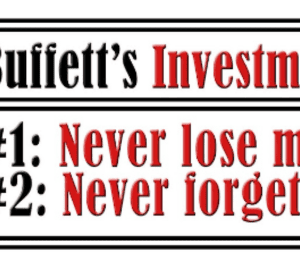How Dead Investors
Can Outperform
the Living
. . . and the investment strategy you can adopt to “join” them
Believe it or not, dead investors can have significant advantages over the living.
To start with, obviously . . .
Dead investors can’t panic
A luxury denied to living investors. Who sometimes cut their profits instead of their losses.
Time and again, the novice investor sees the price of his stock fall and begins to worry.
Every day—sometimes every hour—he looks at the price. If the stock has ticked up, he feels relieved. If it’s dropped, he starts to panic. All too often, when a stock’s price continues to fall the level of his panic has reached such a height that there is only one solution: sell the stock!
All too often, he’s sold near the bottom of a bear market, and his relief turns to dismay as the stock begins to climb back to new heights.
Dead investors continue to “own” their stocks come rain or shine.
And over time stocks which have fallen inevitably rise again.
Being immune to emotion-based decisions like fear, greed, and panic, eventually the dead investor’s stocks will return towards their previous value—and probably keep going up.
Dead investors can’t make any (more!) mistakes
Like buying a “hot stock” that turns out to be a turkey. Or taking profits just before the stock doubles in price.
If you have a tendency to procrastinate, you have probably missed out on a number of good buys or sells. Something that is not (or no longer is) a problem for dead investors.
Dead investors can’t go out on a limb and “wipe out”
Like a couple I knew (no names to protect the guilty) who were heavily into bitcoin, and planned to sell their house so they could quintuple their bitcoin “investment.”
This was just a month or so before the crypto crash, which took bitcoin from $68,789 to $15,599.
Luckily for them it takes time to sell a house. And they got their first offer just after bitcoin collapsed.
Otherwise, they’d be now homeless.
Dead investors cannot buy or sell anything
How can this be an advantage? you might be thinking. One reason:
Research demonstrates that, on average, inactivity is the most profitable strategy for most investors.
In Trading Is Hazardous to Your Wealth: The Common Stock Investment Performance of Individual Investors, published in The Journal of Finance, Brad Barber and Terrance Odean, of Graduate School of Management at the University of California, Davis conclude that:
Individual investors who hold common stocks directly pay a tremendous performance penalty for active trading. Of 66,465 households with accounts at a large discount broker during 1991 to 1996, those that trade most earn an annual return of 11.4 percent, while the market returns 17.9 percent. The average household earns an annual return of 16.4 percent, tilts its common stock investment toward high-beta, small, value stocks, and turns over 75 percent of its portfolio annually. Overconfidence can explain high trading levels and the resulting poor performance of individual investors. Our central message is that trading is hazardous to your wealth [emphasis added].
Plus . . . zero transactions costs
Dead investors’ transactions costs are zero. No brokerage or other fees to eat into his profits (or add to his losses).
And, of course, they simply can’t hear (and are therefore immune) to all the “gold-coated virtually guaranteed” advice of the “Investment Guru of the Month.”
“The investor’s chief problem—and even his worst enemy—
is likely to be himself”
—Benjamin Graham, author of The Intelligent Investor.
Masterly Inactivity
Inactivity is the dead investor’s edge. It’s a lesson all investors should emulate.
But the dead investor is inactive because he has no choice.
Being consciously inactive is an entirely different proposition.
The first advantage, of course, is you reduce your transactions costs.
But in order to achieve that aim, you need to be very clear about your investment strategy.
To me, the ideal stock is one you can “buy and forget.”
Admittedly, there is no such investment: one must continually monitor every investment you own. A multitude of “headwinds” can blow away some or all the advantages you saw in that business when you purchased it.
The management can change for the worse; a new competitor or technological development can eat into a company’s market; consumer tastes can change, as can government regulations—to mention just a few of the factors that could change a great investment into a poor one.
While “masterly inactivity” may not be as exciting* as buying bitcoin or the “hot stock” of the moment, it’s a strategy that is followed by many successful investors.[1]
As the legendary investor Bernard Baruch (who sold all his stocks before the crash of 1929) put it:
“It is unwise to spread one’s funds over too many different securities. Time and energy are required to keep abreast of the forces that may change the value of a security. While one can know all there is to know about a few issues, one cannot possibly know all one needs to know about a great many issues.”
Without question the greatest exemplar of this strategy is Warren Buffett. His net worth of $118 billion put him at #5 on the 2022 Forbes 500 list of the Richest People In The World. Which also gives him the title of the world’s richest investor.
He achieved this status by buying great businesses, either in whole or via the stock market in part, at fair prices . . . and then sitting on them.
Some of them—like See’s Candies, Nebraska Furniture Mart, Coca-Cola, and Berkshire Hathaway’s insurance operations—he has owned for close to half a century!
For decades, he’s spent much of his time “sitting on his butt”—reading companies’ annual reports.
Now that’s Masterly “Inactivity.”
Harness the Investment Genius of
Warren Buffett & George Soros
Discover the Mental Habits and Strategies that made them the World’s Richest Investors
Warren Buffett and George Soros both started with nothing—and made billion-dollar fortunes solely by investing. Their investment strategies are total opposites—yet they religiously follow exactly the same mental habits and strategies.
Adopt these mental habits yourself and Revolutionize YOUR investment returns
[1]If you want excitement, try skydiving. It’s a lot cheaper!
Author: Mark Tier
Author of the bestelling The Winning Investment Habits of Warren Buffett & George Soros, Mark Tier was the founder of the investment newsletter World Money Analyst, which he published until 1991, the author of Understanding Inflation and The Nature of Market Cycles. Since 1991, he's helped start five new (and highly successful) investment publications. When he adopted the the winning investment habits of Warren Buffett & George Soros himself, he sold all his business interests and now lives solely from the returns on his investments. His most recent books including Trust Your Enemies, a political thriller which is “Up there with The Girl With the Dragon Tattoo” and “Worthy of Ayn Rand” according to reviews on Amazon.com, and Ayn Rand's 5 Surprisingly Simple Rules for Judging Political Candidates.
PREVIOUS
Seven More Not-So-Modest Proposals to Improve the Political Process
❮
NEXT
Related Posts
January 24, 2025
July 15, 2024
June 24, 2024
September 4, 2023
May 16, 2023
June 7, 2023
My Books
Free Stuff
. . . widely-held investment beliefs that are hazardous to your wealth. Beliefs that Master Investors like Buffett, Icahn and Soros emphatically do NOT share.









